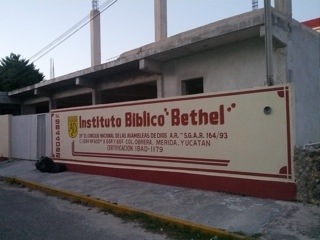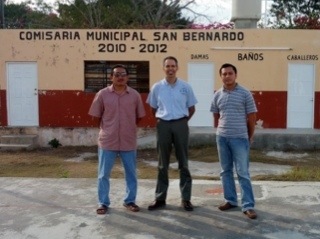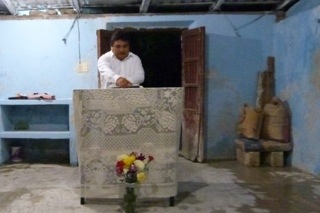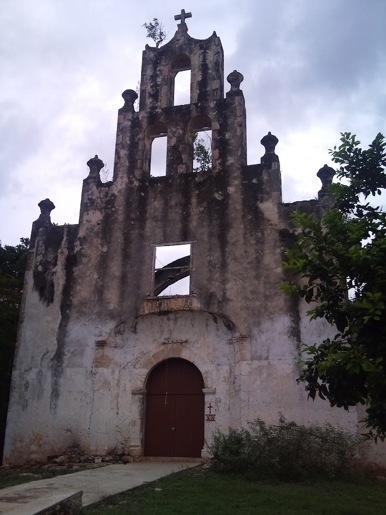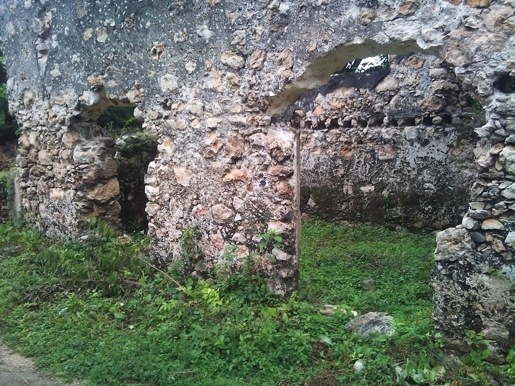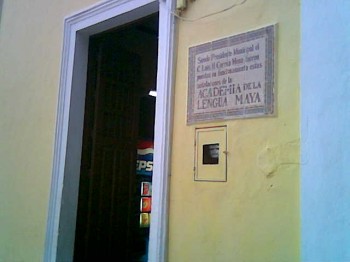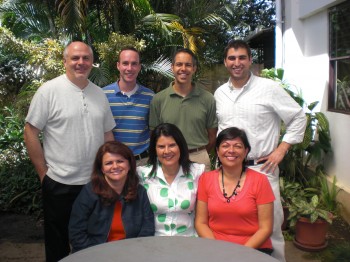
Compañeros de Clase (from left to right back to front): David Isabelli, Steve McCarthy, David Godzwa, Jeremiah Campbell, Margot Soto, Mecbelle Matarrita, Karen Suarez
In just two short days, we say goodbye once again to CINCEL, the A/G language institute in Latin America. As we draw closer to that time of closure I felt it appropriate to pass along what I had shared with our fellow classmates in chapel this past Tuesday. I hope you enjoy it.
As many of you know, this marks our last week here at CINCEL. I thought it appropriate therefore to take these first few moments to say thanks to several who have made these six weeks possible:
First of all, thank you Don and Jacquie for allowing us to come and setting everything in order to make this refresher course possible. Thank you as well to Steve and Jill McCarthy. Although they are a few years our junior, they have been a great big brother and sister to us during our time here in Costa Rica. Thanks as well to my “compañeros de clase.” (see picture above) Gracias por crearme espacio entre ustedes y permetirme compartir en su interacciones. And to all who have enriched our short six weeks, thank you for being a part of our experience.
Of course this leaves me with the problem deciding what thought to leave with such wonderful people. As I was thinking about what to share, I kept coming back to the back to the book of Philippians, a book written by the apostle Paul to a truly wonderful group of people. Aside from being the place of Paul’s first Macedonian convert and the site of the great earthquake that released him from prison and brought his jailer to his knees, Philippi was home to a church which Paul describes as having a “partnership with him in the gospel,” a church that had labored alongside him and had also contributed to meet his personal needs.
As he choose which words to leave with the Philippians, he writes, in Philippians 2:12, “Therefore, my dear friends, as you have always obeyed–not only in my presence, but now much more in my absence–continue to work out your salvation with fear and trembling…” Of course, this direction leaves us asking, “What does it mean to work our our salvation?”
As a missionary, I know what I want it to mean. I want it to mean what Jesus said to the rich young ruler in Luke 18: “You still lack one thing. Sell everything you have and give to the poor, and you will have treasure in heaven. Then come, follow me.” How many of us here today can say, “Been there, done that?” It seems to me sometimes that our goal as a family is to whittle our possessions down to what airlines will allow on board without charging extra fees.
Nevertheless, we come to find that “work our your salvation” signifies much more than simply giving away possessions or even leaving behind friends and family. It means getting to the point where, as Oswald Chambers says, our right to ourselves is completely annihilated, and at the Philippians level, at our level, that may have to do more with what is on the inside than what is on the outside. For instance, we can give away our library and keep our know-it-all attitude. We can sell off our collections and keep our pride. We can leave our homes and still wall ourselves off from others.
That is why I believe that Paul’s statement “work out your salvation” appears in the context of interpersonal relationships. He shows us the way in which we “work out our salvation” in Philippians 2:2-4:
…by being like-minded, having the same love, being one in spirit and purpose. Do nothing out of selfish ambition or vain conceit, but in humility consider others better than yourselves. Each of you should look not only to your own interests, but also to the interests of others
When I read this, there are times that I ask, “Lord, can we go back to the sell everything lesson?” It’s so hard to be like-minded especially when we’re different. Other times, I try to make a deal. I’ll say, “OK, I’ll be like-minded, as long as the others agree with my point of view,” but verse 4 stops my bartering before it can start, “Each of you should look not only to your own interests…”
But just when we feel like we are left gasping for breath, ready to complain to God about the difficult rule that he has left us to follow we find that Paul’s words were not a law to be obeyed, but rather an outflow of the power of the Gospel working within us.
As we read the entire passage, we see, first of all, the conditions in which we work out our salvation:
- encouragement from being united with Christ
- comfort from his love
- fellowship with the Spirit
- tenderness and compassion
All of these we have received in our relationship in Christ and are at work in us as we interact with those who are around us. They are the conditions which provide the environment in which we are to work out our salvation.
Second, we see that God has shown us a model of “worked-out” salvation in his Son, Jesus Christ:
Your attitude should be the same as that of Christ Jesus:
Who, being in very nature God,
did not consider equality with God something to be grasped,
but made himself nothing,
taking the very nature of a servant,
being made in human likeness.
And being found in appearance as a man,
he humbled himself
and became obedient to death–
even death on a cross!
… and we find that it His sacrifice was not in vain as we continue reading:
Therefore God exalted him to the highest place
and gave him the name that is above every name,
10that at the name of Jesus every knee should bow,
in heaven and on earth and under the earth,
11and every tongue confess that Jesus Christ is Lord,
to the glory of God the Father.
So often we lift this passage out of context, using it to explain the mystery of Christ’s existence here on earth, but Paul intended it not as a theology to be analyzed but as a pattern to follow. As we take this passage as Paul had intended it, though, we find that we who share in Christ’s humility will also someday share in his glory.
Still, as if the conditions in which we work out our salvation and the model that God has given us through Jesus were not enough, verse 13 shows us that he is also our help in working out our salvation: “for it is God who works in you to will and to act according to his good purpose.” In fact, I like how this relayed to us in the New International Version in Spanish which translated loosely says, “for God is He who produces in you both the “want to” as well as the “do” so that His will is accomplished.” God has not left us alone in our work. His power is working through us that we might not fail in what He has called us to do.
Therefore, as we go, we want to encourage you to continue to work out your salvation both now and as we go our separate ways by being like minded, having the same love, being one in spirit and in purpose. This way we might truly fulfill God’s desire for us and we might validate the message that we share being “blameless and pure, children of God without fault in a crooked and depraved generation, in which you shine like stars in the universe.”

